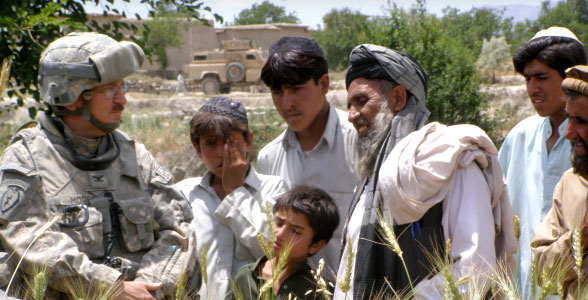By Sergeant First Class Mike Winters
Thirty years ago Afghanistan was a leading agricultural exporter. Agriculture accounted for nearly 80 percent of its economy. That was before the Soviet invasion, though, and the Taliban’s ongoing fight for control, both of which have taken their toll on the country’s farming capabilities, along with all other aspects of the nation’s infrastructure.
Today three University of Tennessee alumni are helping to overcome those losses and allow the Afghanistan economy to thrive once again. The alumni are part of a National Guard Afghan Agribusiness Development Team (ADT). The team, part of the Guard’s Afghan Agribusiness Institute, was started last year to capitalize on the farming knowledge that many Guard soldiers have from their civilian jobs.
Tennessee is one of only a few states chosen to participate in the program, according to unit commander Colonel Jim Moore (Knoxville ’81). To prepare for their mission, Moore and unit members were trained by UT Extension on how to work with farmers in another country to improve agricultural productivity. Methods of conducting rapid agricultural assessments were emphasized, as were such Afghan cultural topics as land ownership patterns, irrigation water control, and the role of religion. Fruit-tree and vineyard pruning and management were also demonstrated.
With the workshops behind them, Moore, Staff Sergeant Roger Broach (Martin ’82, ’86), Staff Sergeant Donald Novotny (Martin ’95), and other members of the agribusiness team arrived in Afghanistan in March. Their unit is on a 1-year deployment serving the Paktya and Paktyka provinces in eastern Afghanistan.
Broach is one of 15 agricultural experts with the mission. As a youth, he was active in Tennessee 4-H Youth Development, attending the National 4-H Congress in Chicago as a state winner. He has years of experience in vegetable production, having grown up on a small farm.
Broach is employed with the Tennessee Department of Labor and Workforce Development. His experience in initiating contracts and working with various types of computer software has benefited the team’s work, as contract origination and negotiations with Afghanistan businessmen and contractors are a critical part of each project’s implementation.
Broach says the Guard Agribusiness Development Team can help Afghanistan help itself.
“If we can show the people the potential of their own capabilities to provide food and income for themselves, they will accomplish it. ADTs have the potential of assisting the Afghan people to improve their overall quality of life through more modern agricultural technology and time-proven techniques of successful farming.
“Another key aspect will be to merge the minds of the Afghan people with Western water management techniques, such as irrigation, flood control, and water retention.”
One of the Tennessee ADT’s responsibilities is to include the various levels of the government of the Islamic Republic of Afghanistan in every activity. This starts at the national level and goes down through the provincial, district, and village governments.
As commander, Moore is responsible for everything that the unit does and does not accomplish, as well as for the health and welfare of the Tennessee National Guardsmen. He helps direct livestock projects and serves as the lead on all agricultural finance projects.
Moore’s background includes a B.S. in agriculture with a major in agriculture education. He was active in FFA and 4-H, was state FFA president in 1977, and received the Torchbearer award, UT Knoxville’s highest student honor, in 1980. As a civilian, he works for a privately owned community bank in central Georgia as the senior commercial lender and a member of its executive team. He uses this knowledge of banking in building the financial aspects of every project.
“Successful business owners—and agriculture is a business—spend as much time on marketing and gross sales opportunities as maximizing production yields.” Moore says. “Also, a growing business must have access to loans and/or banking institutions.” The farmers in eastern Afghanistan are located close to more than 3 billion potential buyers of their agricultural products. They need to understand and produce for the needs and wants of Central Asia’s customers, and that is what is required to make the Afghan farmers successful.
To date, the National Guardsmen have made at least two visits to each of the 14 districts within their territory and conducted assessments of the agricultural situation in conjunction with the local leaders. As a result, nearly a dozen projects for funding through the military’s Commander’s Emergency Response Program have been created and submitted.
Several of these projects are in conjunction with the Paktya University’s School of Agriculture, which was once equal to the schools of agriculture of international universities but is now in the process of rebuilding itself after devastation. The team hopes to implement 50 projects before its duty tour ends and it is replaced with another ADT from Oklahoma, which will assume the projects that are underway.
Some of the projects already launched are:
- a furniture manufacturing training course for local military-aged males
- a livestock association training course
- a beehive construction training course, important to the many apple and apricot producers across the region
- a para-veterinary training program with the Afghan Veterinary Association, viewed as critical to increasing veterinary support for the region
- local training courses on poultry, sheep, and goat husbandry for disadvantaged women and youth
“Living at 7,600 feet elevation with average annual rainfall of 12 inches isn’t like anything in the Southeast,” Moore says. “But the farmers in Afghanistan are similar to U.S. farmers, interested in production quality and quantities, producing enough to feed, clothe, and educate their families.
“They also respond to smiles and firm handshakes.”
Sergeant First Class Mike Winters is the public affairs officer for the Agribusiness Development Team, Tennessee Army National Guard.



